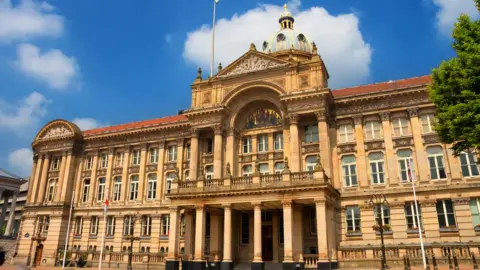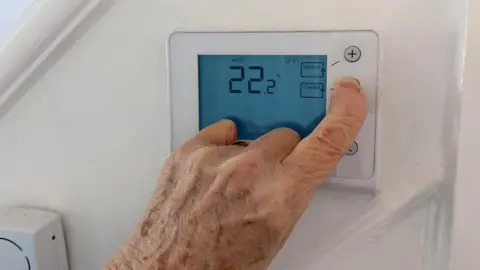Birmingham: Council maps out places for public to keep warm
 Getty Images
Getty ImagesLibraries, art galleries and community centres could become "warm banks" for people struggling to heat their homes.
Birmingham City Council is looking to identify spaces where people can beat the cold while also accessing services and spending time with others.
It comes as the typical household energy bill is set to hit £3,549 a year, regulator Ofgem has announced.
"Keeping warm will be a huge challenge for so many people," said Councillor John Cotton.
"We are going to work with partners to map out spaces across the city where people can go to keep warm," he added.
"Whether that's local community centres, places of worship or libraries, we want to help people to find places where they will be welcomed, free of charge.
"It should not be the case that people cannot afford to keep their homes warm, but that is the reality that we are facing here in Birmingham.
"By mapping out the places where people can go to keep warm, we can help some of the most vulnerable people in our city."
 Getty Images
Getty ImagesThe Local Democracy Reporting Service said research published by Friends of the Earth revealed nearly 9,000 communities would be most affected by spiralling energy costs, with Birmingham the worst affected.
Chris Crean, its West Midlands regional campaigner, called on the government to "stop dithering and start insulating" homes.
He said: "There are almost five-million households in England and Wales without even basic measures such as loft or cavity wall insulation, which means their homes rapidly lose heat and cost more to keep warm.
"A nationwide, street-by-street home insulation programme, focussing on those most in need, would slash energy use, reduce climate-changing pollution and could cut energy bills by £1,000 or more each year."
The government announced in the spring that all households would get a £400 rebate on energy bills, with low-income and vulnerable households receiving an additional £650.

Follow BBC West Midlands on Facebook, Twitter and Instagram. Send your story ideas to: [email protected]
